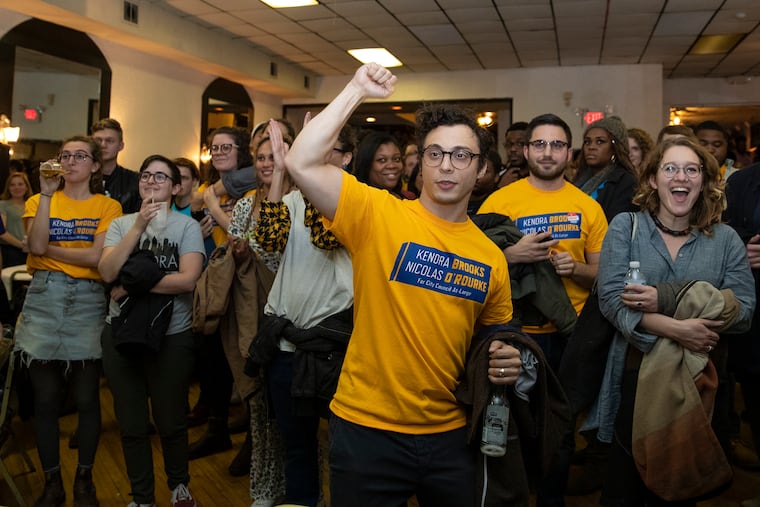Working Families Party bumped a Republican from City Council. Will that actually serve workers or families? | Opinion
It is not Republicans’ fault, though, that Philadelphia has the highest deep poverty rate, coupled with one of the highest rates of taxation, of any metropolitan area in the nation.

If you were paying attention to Philadelphia’s general election earlier this month, you might have the impression that the problem with Philadelphia governance is that we have too many Republicans in power.
That was the campaign pitch of Kendra Brooks, who just won a seat on our City Council with the Working Families Party, knocking off an incumbent Republican and securing one of two seats designated for “minority party” candidates.
Minority party, for anybody familiar with Philly politics, has historically meant Republicans.
Brooks’ pitch was simple, and it worked where it needed to: Vote the Republicans out.
It is not Republicans’ fault, though, that Philadelphia has the highest deep poverty rate, coupled with one of the highest rates of taxation, of any metropolitan area in the nation.
It is not the GOP that is driving so many poor parents to desperately seek options for their children’s education outside of traditional, failing public schools.
And it is not the GOP that rails about over-policing while refusing to acknowledge the murder rate, inching higher and higher as our city government grows more progressive.
If Philadelphia can maintain its relative affordability and address the major problems corroding its core, it will be in spite of the Working Families Party and the Democrats who propelled it to power.
Brooks’ campaign, funded heavily by out-of-state money, drew support from gentrified Democrats, including ward leaders and City Council’s activist laureate Helen Gym, and dominated the wealthy progressive divisions of University City and Chestnut Hill on Election Day. These are the rich, progressive neighborhoods that have propelled Brooks to Council.
Councilwoman-elect Brooks is a rich person’s version of a radical, which makes sense because in our present political economy, it is the wealthy and progressive who are obsessed with burning down the establishment, while the rest of us are just trying to get to work.
So, riding the energy of the activist left, what will Brooks and her allies on Council propose for the working people of Philadelphia?
From the information available on her campaign website, Brooks’ solutions for everyday families run from the contradictory (“stopping fossil fuel expansion” will make it harder for working people to heat their homes and drive to work) to the oddly specific (“investments in community-owned renewable energy projects by communities of color”).
Her campaign positions offer nothing to provide tax relief on overburdened families. Nothing to support victims of crime. Nothing to help job creators in the city.
It is the WFP’s economic illiteracy that would be the most damaging to the working people of Philadelphia. Rent control, the central aspect of Brooks’ proposed housing plan, reduces the incentive for developers to build new housing. This would be counterproductive to lower costs.
Brooks also wants to “make sure low-wage employers … pay back the city for the costs of poverty.” The language of “paying back the city” for creating a job independently — even at a low wage — shows a disdain for these types of jobs and these types of employees. These jobs are important for the people who hold them, but perhaps the WFP prefers that no such jobs exist at all.
Brooks declares that the city must “demand the developers, universities and corporations pay their fair share to our schools.” For a supporter of teachers unions like Brooks, that likely translates to tax hikes to pour more money into Philadelphia’s failing public schools, even as some parents clamor to get out of them.
And it is on schooling, especially, where the progressives’ rhetoric falls most out of line with the working families they claim to represent. Calls for “fair funding” can always be translated to more funding for traditional public schools, which benefit established teachers unions far more than they do students.
Poor and working families, who increasingly bank on diminishing odds to get their kids into high-performing charters, will get short shrift if the ideologies of the Working Families Party prevail. I believe it is unlikely that anyone will ask Councilwoman-elect Brooks, Councilwoman Gym, or for that matter, Mayor Jim Kenney how having less school choice helps a working mother in North Philadelphia.
Or why Philadelphia is following in the footsteps of such progressive bastions as New York City and San Francisco, which have increasingly become gentrified urban cores surrounded by broad swathes of poverty.
But progressives can ignore all that. Because the point of this election was to stick it to the Republicans.
Albert Eisenberg is a Philadelphia-based political consultant. He formerly served as the communications director for the Philadelphia Republican Party and is a founder of Broad and Liberty. @Albydelphia